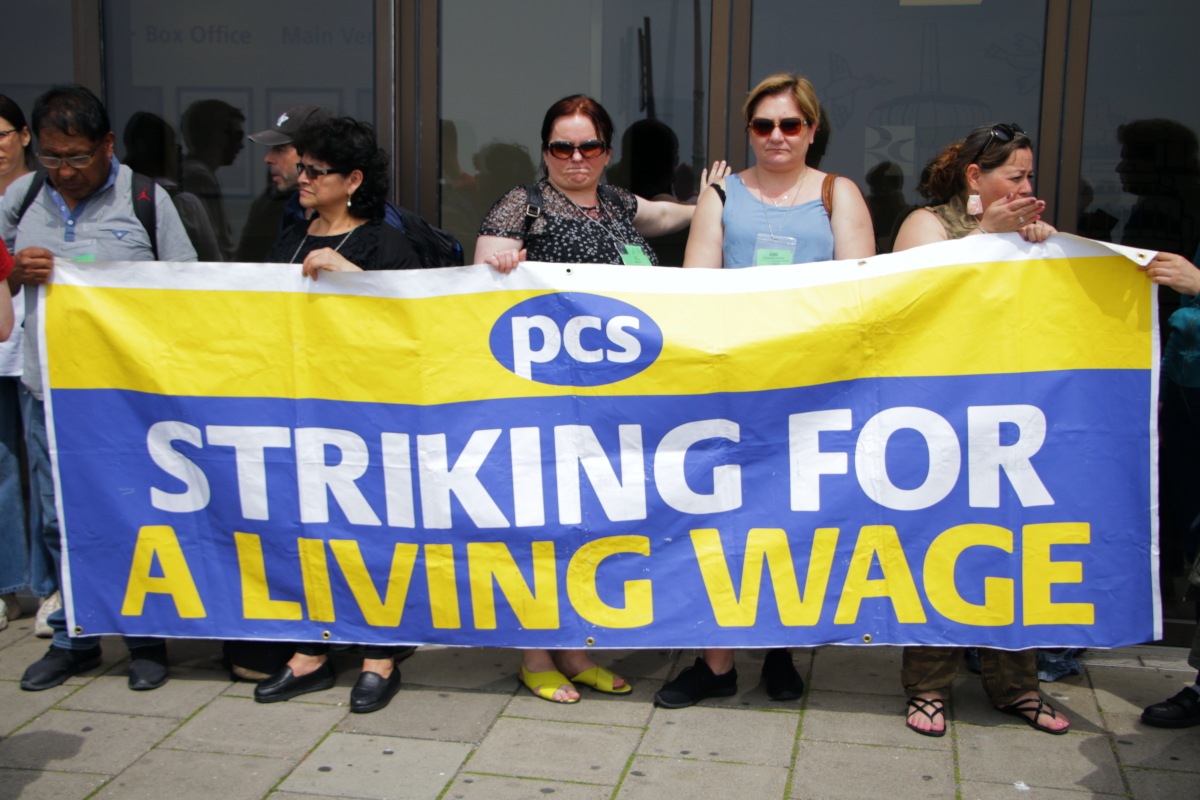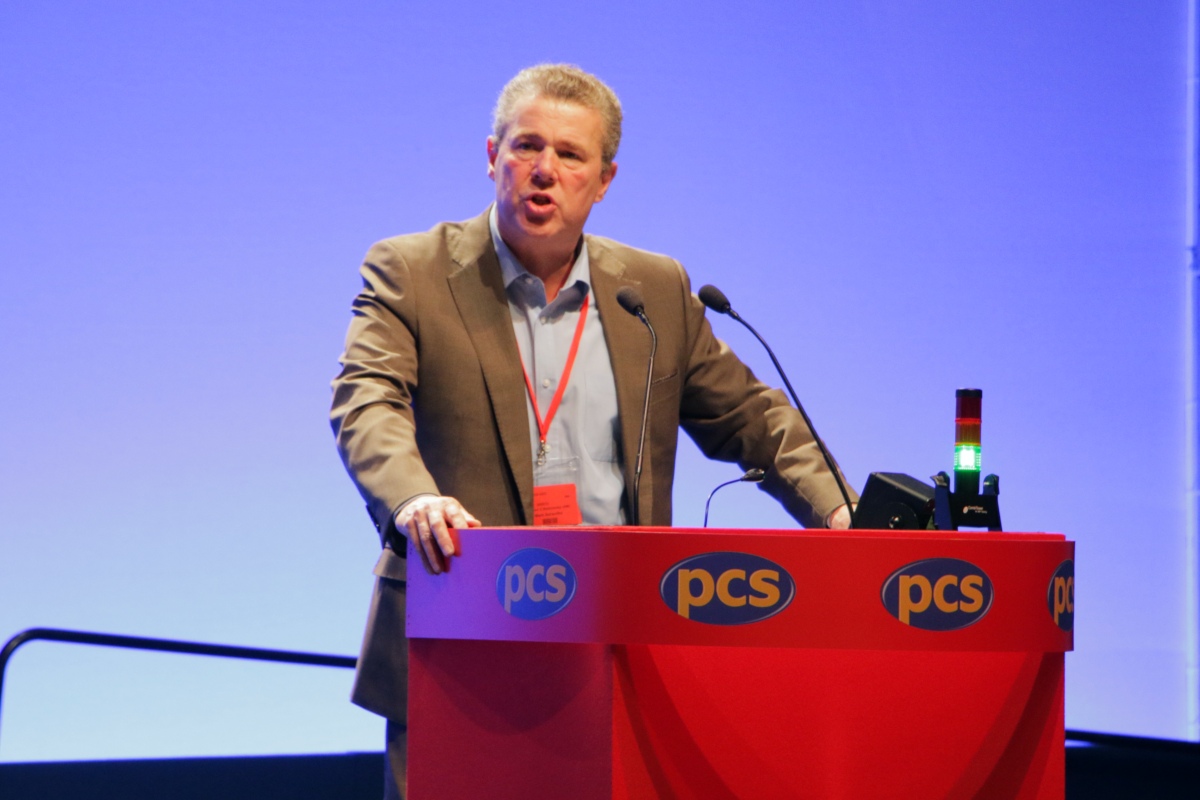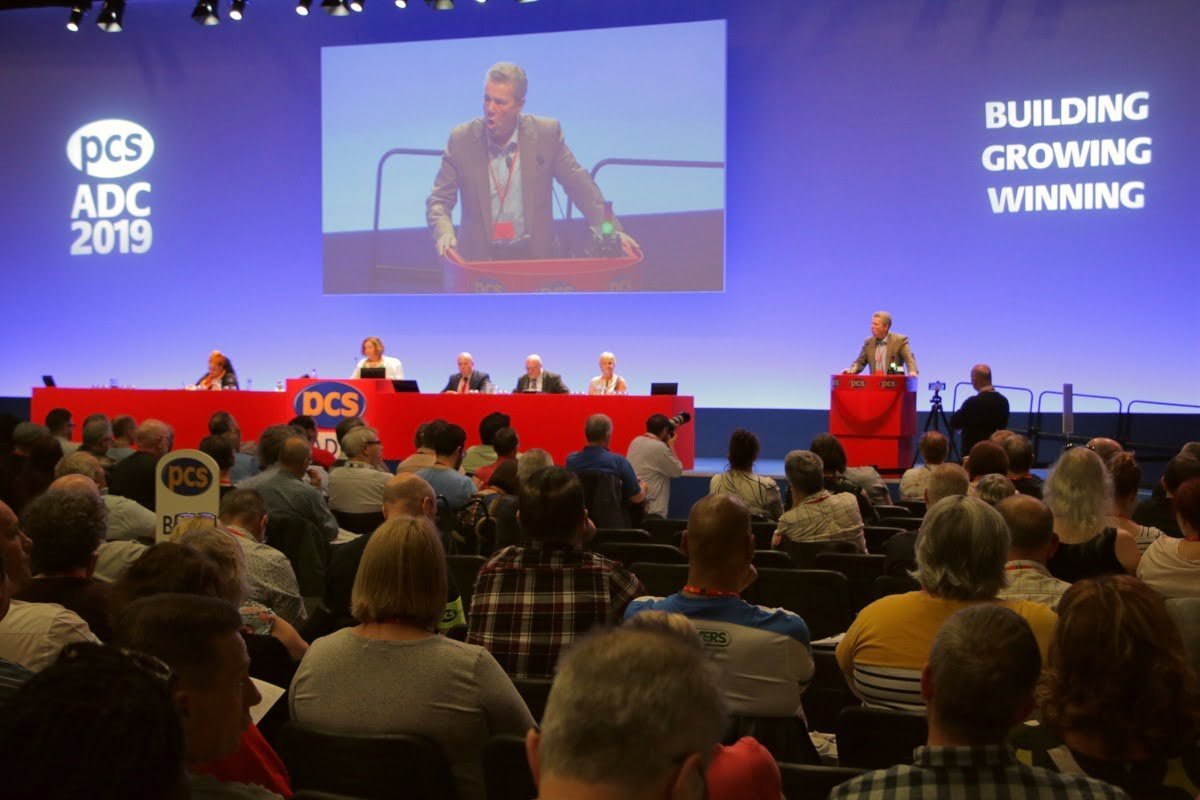Delegates from the civil servants union have been meeting in Brighton this week for the annual PCS conference. The questions of the pay campaign and the Labour Party dominated the discussion.
This year’s PCS national conference took place against the backdrop of the surprise result in the union’s AGS (assistant general secretary) election, as well as the recent vote for strike action over pay. This was the biggest vote for industrial action in the history of the union. Despite this, the ballot failed to reach the Tory imposed threshold.
The conference discussed a wide range of topics: from the rising far-right threat to the benefits system to international issues.
One of the key debates of conference was over pay. Weeks earlier, the union had failed by just over 2,000 votes to break through the 50% turnout required for legal strike action. Nevertheless, historically, it was a marvellous result, only failing because of the Tories and their cynical block.
Fighting for pay
 The question of how to take forward the struggle over pay – for workers who have experienced years of cuts in real wages – led to a heated debate in the opening session of conference, on Tuesday afternoon.
The question of how to take forward the struggle over pay – for workers who have experienced years of cuts in real wages – led to a heated debate in the opening session of conference, on Tuesday afternoon.
The NEC put forward an emergency motion urging conference to continue the pay fight with a strategy involving a national campaign, the strengthening of weaker areas, and a focus on improved workplace organising. The union leadership put forward the need for a national aggregated ballot on pay at the earliest appropriate time. This followed a very positive fringe meeting on the lessons of the pay dispute the previous evening.
But this line was opposed by delegates from BEIS London South and DWP South East Wales branches, who called instead for more analysis and debate about the previous ballots and the consideration of all tactics. This included the idea of disaggregated ballots, linked to other issues, such as pensions and closures. This would then be followed by a special conference.
This defeatist line had been put forward before and soundly rejected. Instead of maintaining the momentum, such a strategy would serve to derail it.
Astonishingly, however, some on the left supported this position, including the Socialist Party (SP). They lined up behind the more conservative layers to promote this failed policy, which would undermine workers’ unity and play into the hands of the employer.
Only by uniting the union around a national ballot for national action – not separate sections – can PCS and its members defeat the government. No department, not even the big ones, can win on their own. The left has always understood this basic principle of the need for unity.
Those who opposed the NEC motion introduced much confusion and threw up a lot of dust, which was viewed as a deliberate ploy. It was clear that artificial differences were being introduced for sectarian reasons. Fortunately, in the end, the NEC motion was passed on a card vote.
Censure
 Motion 21 from R&C East Kilbride and R&C Bristol & Reading branches on support for transgender equality also owned up a big debate at the conference. The delegates challenged Mark Serwotka for putting his signature on a letter in the Morning Star, along with other union general secretaries, which condemned the violence carried out by extreme trans activists against trade unionists. This was portrayed as being an attack on trans rights, which it was not.
Motion 21 from R&C East Kilbride and R&C Bristol & Reading branches on support for transgender equality also owned up a big debate at the conference. The delegates challenged Mark Serwotka for putting his signature on a letter in the Morning Star, along with other union general secretaries, which condemned the violence carried out by extreme trans activists against trade unionists. This was portrayed as being an attack on trans rights, which it was not.
The issue was blown out of proportion, including by members of the SP. It was completely false to label Mark or the left-wing NEC as in any way transphobic. Despite appeals by Angela Grant for unity and a calm atmosphere and debate, the majority of conference had been deliberately whipped up on this sensitive issue in order to censure the NEC.
For a Corbyn Labour government
 One of the more important questions facing the union is the election of a Corbyn-led Labour government. The last PCS conference agreed that a consultation would be held throughout the union “on the means by which we can increase our support for a campaign to get a Corbyn and McDonnell-led UK Labour government elected”. As the consultation paper explains:
One of the more important questions facing the union is the election of a Corbyn-led Labour government. The last PCS conference agreed that a consultation would be held throughout the union “on the means by which we can increase our support for a campaign to get a Corbyn and McDonnell-led UK Labour government elected”. As the consultation paper explains:
“Just as British politics has changed, PCS policy has changed with it. The view that a civil service union should not intervene in the political arena used to be widely accepted. But, as the civil service has been politicised by successive governments, and as cuts and privatisation programmes have fundamentally attacked PCS members’ terms and conditions, we have become more active in the political arena.”
While not affiliating to Labour, PCS could move in the direction of the RMT, which has aligned the union with the Labour Party, asking its members to join the party.
The consultation will finish in December. However, if a general election is called before then, the left NEC will decide how to proceed.
The clearly positive feelings towards Jeremy Corbyn and Labour were indicated by the standing ovation that Jeremy received from delegates, when he addressed the conference on the last day.
Jeremy pledged to remove the anti trade union laws, introduce electronic balloting, restore facility time, end the pay freeze, as well as many other welcome reforms.
It is clear given this mood that PCS members will play an active role in securing a Corbyn-led Labour government when the time comes. This is the way forward.






